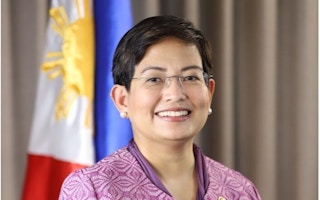Philippine finance undersecretary Cielo Magno, an outspoken critic of the mining industry in the country, on Thursday confirmed that she has resigned from her post.
She was asked to quit her job reportedly over a Facebook post that questioned President Ferdinand Marcos Jr’s policy of setting a price ceiling on some rice products amid rising prices of the most common staple food among Filipinos.
Magno’s resignation will be effective on 16 September. She will be going back to teaching at the University of the Philippines School of Economics.
Even before her social media post, Magno had openly advocated for transparency in government especially for increased taxes on mining corporations.
She was a member of the international board of the Extractive Industries Transparency Initiative (EITI) representing civil society, where she spearheaded a report that led to the Philippines’s withdrawal from the intiative in 2022. The EITI is a mechanism that ensured the government discloses key information about extractive industry operations and earnings, and engages with environmental activists and communities.
“
We find her resignation unsurprising as she has virtually been forced out of government because of her outspoken and strong positions on transparency and good governance.
Jaybee Garganera, national coordinator, Alyansa Tigil Mina
EITI found that that Philippines only “partly met” a standard on full engagement with civil society, based on Magno’s report that included detailed instances of red-tagging – that is, the malicious blacklisting of individuals who are critical of the government – of some members and a climate of fear among environmental defenders. The country rejoined the global initiaitve in the same year, vowing to be more transparent about domestic mining activities.
President Marcos, Jr has openly put forward mining as a means to ensure the sustainable recovery of the Philippine economy from pandemic disruptions, instituting relaxed rules to speed up project approvals for extracting transition minerals like nickel and copper.
On Friday, executive secretary Lucas Bersamin told local media that Magno’s termination “could only be expected as she clearly does not support the administration and its programmes for nation-building.”
Jaybee Garganera, national coordinator of anti-mining coalition Alyansa Tigil Mina said he “strongly disagrees” with Bersamin’s statement because Magno was only doing her job and “not the interest of political dynasties.”
“We find her resignation unsurprising as she has virtually been forced out of government because of her outspoken and strong positions on transparency and good governance. For one, her advocacy for increased taxes on mining corporations was clearly inconsistent with the agenda of house speaker Martin Romualdez and contributed to her unpopularity inside the government,” said Garganera.
When Marcos, Jr took office last year, he backed his first cousin, Martin Romualdez, to be elected as speaker of the house of representatives, the fourth highest official in the land, who is able to sign laws and resolutions, as he presides over sessions in congress.
Romualdez is tied to the mining industry. He is son of the late Benjamin Romualdez, former president and chief executive officer of copper and gold mining behemoth Benguet Corp.
Romualdez’s son sits on the board of directors of nickel mining firm Marcventures Holdings. The congressman himself set up a mining subsidiary last year worth US$2.7 million.
Among Marcos Jr’s staunchest allies in his cabinet are a troop of officials with high stakes in the mining sector. Senator Cynthia Villar, chair of the senate committee on environment and natural resources, and her son Senator Mark Villar, own Prime Asset Ventures Inc, the parent company of TVI Resources Development Phils. Inc., which produces nickel. Senator Sherwin Gatchalian has a family-owned business The Wellex Group whose mining subsidiary extracts nickel and limestone.
Want more Philippines ESG and sustainability news and views? Subscribe to our Eco-Business Philippines newsletter here.





















